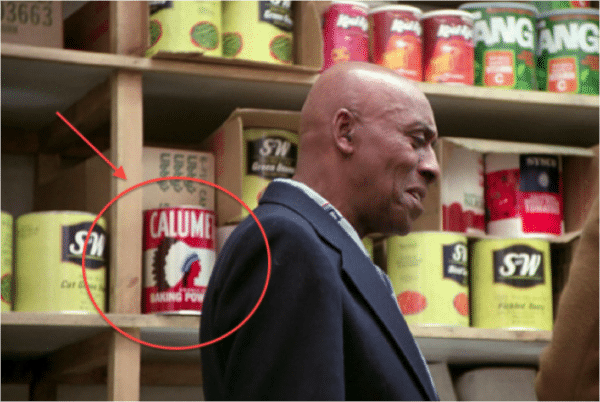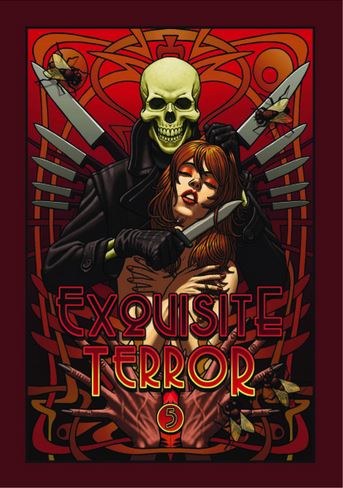Maybe we’re a little biased as in the not-too-distant past we released a magazine of our own, but it’s always good to see the resurgence in print media, and Exquisite Terror – now in its fifth edition – is a stylish, studious take on horror, with original illustrations and content. Running to just over 50 pages, the focus is once again on quality not quantity, with a range of features and interviews spanning both film and literature.
By far the longest article in the publication – running to nine pages, minus the accompanying full-page illustrations – is James Gracey’s study of Dario Argento, entitled Penetrating Flesh. It’s a detailed analysis, by and large ‘critiquing the critiques’ by discussing a range of existing articles or books which allude to the intersections of horror, sex and cinema. There are some intriguing points made, though several of these critiques hinge upon pornography as a misogynistic monolith, something I feel needs to be looked at with a more nuanced eye by those who so often invoke it. That said, Gracey does question some of the ideas about women as passive mutes, pointing out that in Argento’s films, this is refuted as much as reinforced. Penetrating Flesh is scholarly in tone, though also displays a fan’s knowledge, whilst referencing a lot of further reading and research.
On the Trail of the Witchfinder
 Personally, out of the entire publication, I most enjoyed Jon Towlson’s feature on British director Michael Reeves. Reeves, who directed two phenomenal films (The Sorcerers and Witchfinder General) died as a very young man following an overdose. Towlson’s feature focuses on the psychogeography of Reeves’ life, looking at the homes and pubs which were not only close to his heart, but probably integral to how he lived. These spaces were where he socialised, threw ideas around and – towards the end – grappled with what he saw as the deeply wrongheaded criticisms of his work, particularly the then much-maligned Witchfinder General, now considered a classic of its genre. It’s an interesting perspective, looking squarely at the seeming incongruity between Reeves’ films and his surroundings but always remaining sympathetic and engaged. It’s hard to disagree with the conclusion of this piece – that the death of Michael Reeves so very young was a phenomenal loss.
Personally, out of the entire publication, I most enjoyed Jon Towlson’s feature on British director Michael Reeves. Reeves, who directed two phenomenal films (The Sorcerers and Witchfinder General) died as a very young man following an overdose. Towlson’s feature focuses on the psychogeography of Reeves’ life, looking at the homes and pubs which were not only close to his heart, but probably integral to how he lived. These spaces were where he socialised, threw ideas around and – towards the end – grappled with what he saw as the deeply wrongheaded criticisms of his work, particularly the then much-maligned Witchfinder General, now considered a classic of its genre. It’s an interesting perspective, looking squarely at the seeming incongruity between Reeves’ films and his surroundings but always remaining sympathetic and engaged. It’s hard to disagree with the conclusion of this piece – that the death of Michael Reeves so very young was a phenomenal loss.
By and large, Exquisite Terror 5 belongs to older, dare I say ‘classic’ horror, for the most part. The Script Behind the Classic: The Omen by Martyn Conterio offers a neat potted history and some interesting facts about the film, contextualising it by pointing to the increasing absence of ‘God’ from society at the time. It’s a fair point; Time Magazine ran its ‘Is God Dead?’ cover in the late 1960s and some good godless horrors were spawned in the years which followed, including The Omen. This is a readable and engaging article.
A new perspective on Hannibal Lecter is offered in Impenetrable Sanity, a feature which considers the character from the point of view of legal definitions of sanity, deciding that it’s unlikely Lecter would have got away with an insanity ruling in the first place, given his profile and behaviour. This is a somewhat dry account in places, but I can’t deny that it’s an interesting way to come at one of the most notorious characters in crime fiction. Sticking with fiction writing, a conversation with esteemed author Ramsay Campbell on his memories of fellow author, Robert Aickman, is full of warmth and good humour, though of course if you’re unfamiliar with Aickman, then reading some of his work should be your first port of call. There’s another interview in ET5, definitely of interest to 80s horror fans, with ‘Uncle’ Bob Martin, formerly of Fangoria Magazine. Integral to early fandom for many, Martin discusses his early experiences of running the magazine (including where it got its name) and chats about his work with Frank Henenlotter, the master of bizarre body horror.
God Bless America…
 Exquisite Terror doesn’t seem to have an overarching editorial policy, meaning there’s no impetus to toe a line, one way or another. This boosts the variety of features on offer – a good thing – though of course it also means that I, like anyone else, will always prefer some articles to others. God Bless America: Stephen King’s Shining by Jim Reader comes to mind here I’m afraid: there’s nothing whatsoever wrong with how this piece is written, as it flows well, but the claims it makes about Kubrick’s seminal horror film seem based on very tenuous evidence. These feel like pre-existing tenuous claims, too, as many improbable interpretations of The Shining already featured in the frankly bonkers documentary film Room 237 (2012), which at the very least made me wonder what it is in particular about The Shining that bears such strange fruit. The premise – that Kubrick’s film is a commentary on the historical treatment of Native Americans, based on two lines of dialogue and some incidental images of Native Americans – is no more convincing now that I encounter it for the second time here. On a similar note, Once Bitten: The Queerness of Becoming Other ostensibly features a ‘queering’ of a handful of werewolf films, but what’s counted as lycanthropic in nature seems a little broad. Also, to my eye, some of the interpretation seems somewhat awry (I don’t know Der Samurai, but one of the key scenes mentioned as evidence of the links between queerness/othering seems to have firm markers of hetero-, rather than homo-erotic lust.) Finally, if you say that werewolf films reflect the anxieties about the AIDS panic of the 80s, then I think we need specific examples.
Exquisite Terror doesn’t seem to have an overarching editorial policy, meaning there’s no impetus to toe a line, one way or another. This boosts the variety of features on offer – a good thing – though of course it also means that I, like anyone else, will always prefer some articles to others. God Bless America: Stephen King’s Shining by Jim Reader comes to mind here I’m afraid: there’s nothing whatsoever wrong with how this piece is written, as it flows well, but the claims it makes about Kubrick’s seminal horror film seem based on very tenuous evidence. These feel like pre-existing tenuous claims, too, as many improbable interpretations of The Shining already featured in the frankly bonkers documentary film Room 237 (2012), which at the very least made me wonder what it is in particular about The Shining that bears such strange fruit. The premise – that Kubrick’s film is a commentary on the historical treatment of Native Americans, based on two lines of dialogue and some incidental images of Native Americans – is no more convincing now that I encounter it for the second time here. On a similar note, Once Bitten: The Queerness of Becoming Other ostensibly features a ‘queering’ of a handful of werewolf films, but what’s counted as lycanthropic in nature seems a little broad. Also, to my eye, some of the interpretation seems somewhat awry (I don’t know Der Samurai, but one of the key scenes mentioned as evidence of the links between queerness/othering seems to have firm markers of hetero-, rather than homo-erotic lust.) Finally, if you say that werewolf films reflect the anxieties about the AIDS panic of the 80s, then I think we need specific examples.
Still, overall I enjoyed Exquisite Terror 5, just as I enjoyed Exquisite Terror 4. It doesn’t really matter if I don’t agree with every word; sometimes it’s half the fun if I don’t, whilst I can appreciate the trials and tribulations involved in keeping a project going to such a good standard and appreciate the magazine as a worthwhile endeavour. The only slight shame is that Naila sticks to editing rather than writing herself these days, but she’s clearly comfortable handling the editorial aspects. Should you enjoy a somewhat more highbrow take on horror, then this magazine is one for you. Long may it reign.
Exquisite Terror 5 is now available for pre-order. You can find it, and previous editions, here.
